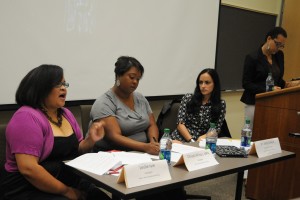Socioeconomic disparities affecting LA minorities
Leslie Ivie, ambassador of the Liberty Hill Foundation, an L.A.-based nonprofit, described on Monday the state of socioeconomic conditions in Los Angeles and suggested solutions for closing the wealth gap in the United States at Closing the Racial Wealth Gap.
“Let’s imagine a grand canyon as the wealth gap, and the water that formed and eroded it as the policies that have been enacted in the last few decades,” Ivie said. “It was not individual laziness that caused [the gap], but the erosion of policies and laws over time.”

Wealth · Leslie Ivie (left), ambassador of the Liberty Hill Foundation, speaks at a panel Monday on the widening socioeconomic divide. - Otto Hsiao | Daily Trojan
Ivie cited a speech by Congresswoman Barbara Lee (D-Calif.), in which Lee blames Wall Street for the widening socioeconomic divide in the United States.
“Wall Street has focused its efforts on stripping minority communities of what little [assets] they have managed to earn,” Lee said. “A fundamental cornerstone of the American dream is becoming tougher and tougher to accomplish.”
A recent Pew Research Center study found that levels of poverty and unemployment for minority communities hover at about twice the national average.
Chrysta Wilson, managing partner of Social Change Consultants, said the socioeconomic divide among minority populations is attributed to how policies are written and implemented.
“Policies were integral in the building of this wealth gap,” Wilson said. “While policies aren’t on face racist, the way they’re written and enforced has systematically eliminated people of color from building assets.”
Ivie, who served as a public defender prior to joining the Liberty Hill Foundation, said socioeconomic disparities among minorities also have unpredictable legal ramifications.
“If you’re a low-income woman charged with prostitution as a misdemeanor, which is often because of economic or mental health reasons that you enter the profession, you have no money and have to wait all day for this [meeting],” Ivie said. “You have to pay babysitters, get off work, sometimes lose jobs as a result. That’s a systemic level impact on communities of color.”
Jody Vallejo, an assistant professor of sociology, said the discriminatory housing market creates barriers to structural change for impoverished minorities.
“If you don’t have access to assets, you cannot prevent downward mobility,” Vallejo said. “Home ownership is the way by which most measure wealth.”
Marisol Maciel-Cervantes, a graduate student studying planning, said the recession has augmented the socioeconomic divide among the American population.
“A gap does currently exist, and given the current recession, the gap is increasing,” Maciel-Cervantes said.
The situation, however, is improving for impoverished minorities, Wilson said, but she warned there is still a need for new policies and action.
“The boat has gotten bigger, things look better,” Wilson said. “But, then there’s rain and chaos and tornadoes and the boat still overturns.”
The event, sponsored by the Sol Price School of Public Policy, was held in Ralph and Goldy Lewis Hall.
Austin Byron contributed to this report.
